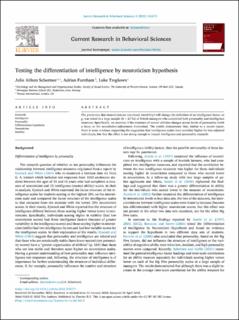| dc.contributor.author | Schermer, Julie Aitken | |
| dc.contributor.author | Furnham, Adrian | |
| dc.contributor.author | Treglown, Luke | |
| dc.date.accessioned | 2022-08-03T07:03:28Z | |
| dc.date.available | 2022-08-03T07:03:28Z | |
| dc.date.created | 2022-07-18T16:10:55Z | |
| dc.date.issued | 2022 | |
| dc.identifier.citation | Current Research in Behavioral Sciences. 2022, 3 . | en_US |
| dc.identifier.issn | 2666-5182 | |
| dc.identifier.uri | https://hdl.handle.net/11250/3009871 | |
| dc.description.abstract | The prediction that neuroticism (or emotional instability) will change the definition of an intelligence factor, or g, was tested in a large sample (N = 2,716) of British managers who completed both personality and intelligence measures. Specifically, we examine if the structure of mental abilities changes across levels of personality (with a focus on the neuroticism/adjustment dimension). The results demonstrate that, similar to a recent report, there is some evidence supporting the suggestion that intelligence scales inter-correlate higher for less adjusted individuals, but that the effect is not strong enough to impact intelligence and personality research. | en_US |
| dc.description.abstract | Testing the differentiation of intelligence by neuroticism hypothesis | en_US |
| dc.language.iso | eng | en_US |
| dc.publisher | Elsevier | en_US |
| dc.rights | Attribution-NonCommercial-NoDerivatives 4.0 Internasjonal | * |
| dc.rights.uri | http://creativecommons.org/licenses/by-nc-nd/4.0/deed.no | * |
| dc.subject | Intelligence | en_US |
| dc.subject | Personality | en_US |
| dc.subject | Differentiation hypothesis | en_US |
| dc.subject | Neuroticism | en_US |
| dc.subject | Stability | en_US |
| dc.title | Testing the differentiation of intelligence by neuroticism hypothesis | en_US |
| dc.title.alternative | Testing the differentiation of intelligence by neuroticism hypothesis | en_US |
| dc.type | Journal article | en_US |
| dc.description.version | publishedVersion | en_US |
| dc.rights.holder | The Authors | en_US |
| dc.source.pagenumber | 4 | en_US |
| dc.source.volume | 3 | en_US |
| dc.source.journal | Current Research in Behavioral Sciences | en_US |
| dc.identifier.doi | 10.1016/j.crbeha.2022.100073 | |
| dc.identifier.cristin | 2038688 | |
| cristin.ispublished | true | |
| cristin.fulltext | original | |

